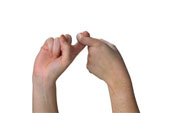Food for Thought
...where I serve up tasty book facts and anecdotes.
In Kimchi & Calamari, Joseph reads and later dreams about Sohn Kee-chung. He really did exist.
 Korea was under Japanese occupation when Sohn Kee-chung was forced to compete for the Japanese team at the 1936 Olympics, held in Berlin, Germany. He was forced to use the Japanese name, Kitei Son, but he protested by refusing to sign his name. Instead he sketched the shape of Korea on the page. And when reporters asked about his country, he would say that Korea was his motherland, not Japan.
Korea was under Japanese occupation when Sohn Kee-chung was forced to compete for the Japanese team at the 1936 Olympics, held in Berlin, Germany. He was forced to use the Japanese name, Kitei Son, but he protested by refusing to sign his name. Instead he sketched the shape of Korea on the page. And when reporters asked about his country, he would say that Korea was his motherland, not Japan.
Sohn Kee-chung won Korea’s first gold medal in the men’s marathon and broke the existing world record. At the medal ceremony, when the Japanese flag was raised instead of the Korean flag, he shed tears.
After the Japanese occupation ended, Sohn Kee-chung went on to coach many of Korea’s best marathoners. He also became the chairman of the Korean Sporting Association. And in what had to be an emotional moment, Sohn Kee-chung carried the Olympic torch in at the opening ceremony at the 1988 Olympics held in Seoul. Hooray for him!
Did you know…
- Tess’s good friend Winnie loves Motown music. I do too!
Motown performers like Smokey Robinson & The Miracles, Diana Ross & The Supremes, The Four Tops and The Temptations got their start thanks to a music genius named Berry Gordon, Jr.. Beginning at the dawn of the civil rights movement, Motown was an African-American owned industry that gave all Americans something they couldn’t get enough of: groovin’, movin’ music!
- Jordan Dobson, Tess’s fun-loving little brother is deaf.
 An estimated ten million people in the U.S. are hard of hearing and one million are deaf. The majority of deaf people communicate with sign language. Sign language uses hand signals and body language to convey meaning. Many schools offer sign language as an official language of study. Here is a place to learn more about American Sign Language (ASL).
An estimated ten million people in the U.S. are hard of hearing and one million are deaf. The majority of deaf people communicate with sign language. Sign language uses hand signals and body language to convey meaning. Many schools offer sign language as an official language of study. Here is a place to learn more about American Sign Language (ASL).
